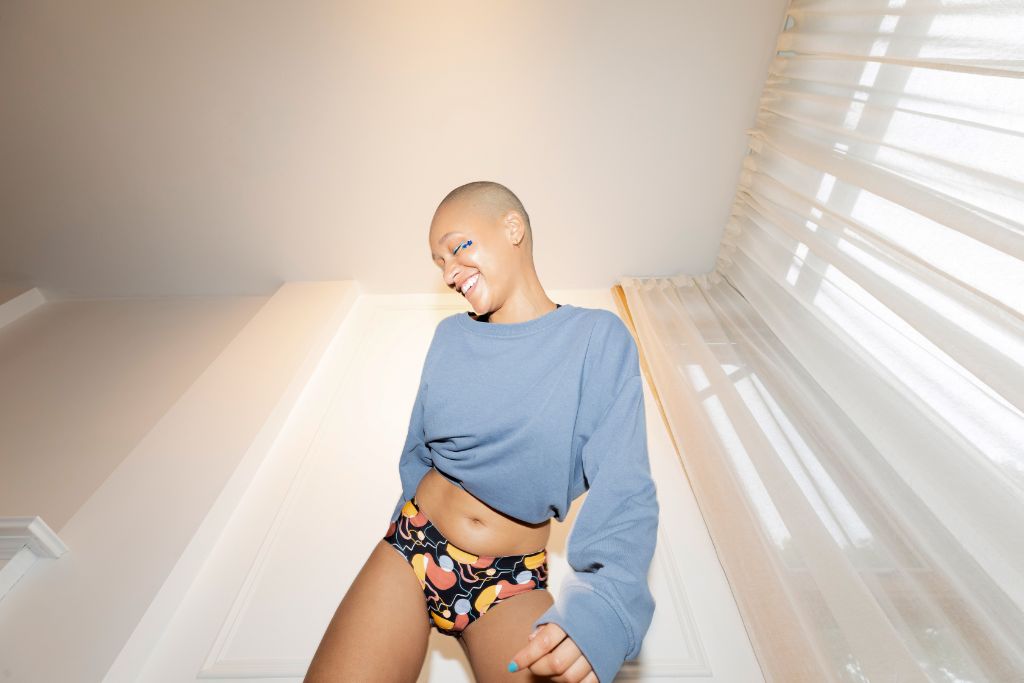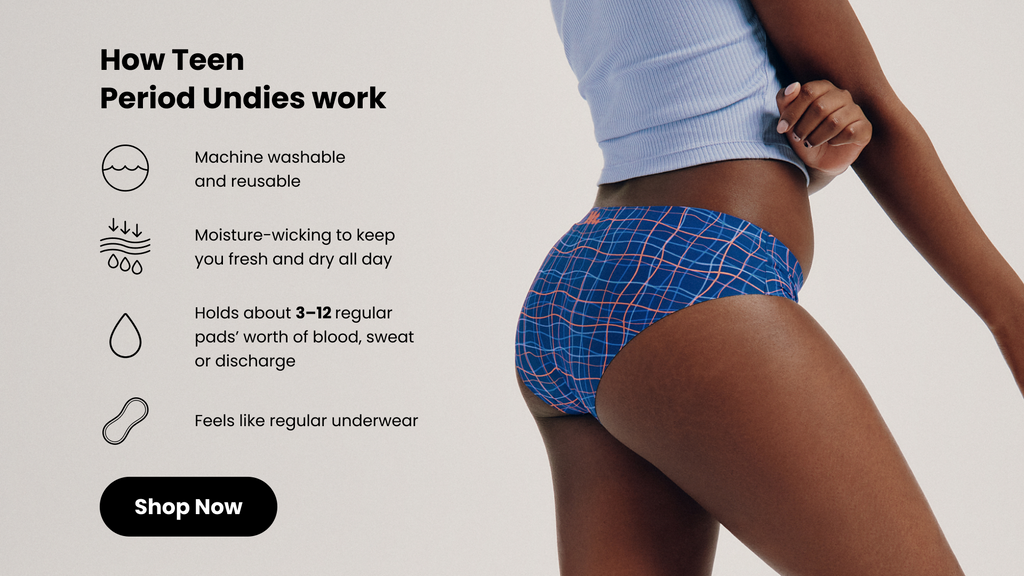Though undoubtedly uncomfortable to experience, puberty is inevitable. It’s something that we all go through at some point or another, and as awkward as it may be, puberty is an important time in a person’s life as they grow and develop into adulthood. As parents, this can be a confusing time as well. You might have found yourself wondering how you can best help your Assigned Female at Birth (AFAB) child navigate puberty.

While it can cause for both nerves and excitement, knowing what to expect and how it affects your AFAB child’s body can make the experience less stressful for both of you.
We have compiled some common questions and answers about puberty to make your child’s experience smoother, to help you answer any questions they may have, and to guide you as a parent through this transition as well.
What is puberty?
Puberty is the process of when one’s body changes from child to adult. It doesn’t happen all at once, but in stages, taking many years. For many girls, puberty ends in their late teens, with the average age being 17 or 18 years old. Here’s a quick science breakdown of what it is;
Puberty is controlled by hormones. The pituitary gland releases hormones that make the body grow. When AFAB people reach a certain age, usually somewhere between the ages of eight and 13, the gland then begins to release different hormones to mature the body. These hormones cause the sexual organs in the body– in AFAB folks, the ovaries–, to begin to produce other hormones, estrogen and progesterone, which cause the visible signs of puberty, hair growth and genital development to occur.
Be prepared: Shop period kits now to prevent leaks once your actual period begins
It’s important to know that each AFAB puberty experience is different and unique; no experience is wrong. For parents guiding their child through puberty, it’s vital to be compassionate and present to what your child is experiencing. It can be frustrating for your child if their friends' development starts to happen earlier and they feel left behind, or if the opposite is true and they are the first to go through puberty in their class.
When Does Puberty Start? Is It True That It’s Starting Earlier Than Usual?
Puberty is different for every single person. There isn’t an exact age, but it's common for AFAB folks to start puberty between the ages of eight and 13. This explains why some develop earlier than others, and others experience delayed puberty.
Once AFAB puberty starts, your child will grow pubic hair and develop breast buds. You can expect that their period will start about one to two years after that.
Studies have shown that puberty is starting earlier and earlier. There are many factors to this, but obesity, environmental factors and stress can affect one's period. For more info read our post on what age people usually get their period.
Early Puberty in Girls and AFAB People
It can be tough when a child goes through puberty early. Your child might feel confused when none of their friends are developing and why they have breast buds, or are wearing bras at nine years old. Your child may begin menstruating earlier as well.
If you have a family history of beginning puberty early, keep this in mind when to teach your child about their physical development and different stages of puberty. If this is happening to your child, remind them that everyone else will catch up to them. We're all on our own journey!
Everybody’s experience with puberty happens on a different timeline. This can be a confusing time, but it’s important for your child to feel like they have someone to talk to while going through these life-changing experiences. Try to be that person for them; Speaking openly will help eliminate embarrassment from their situation and ensure they feel comfortable.
Further reading: Does caffeine help period cramps?
Signs and Stages of Puberty
Some signs of puberty happen overnight, while other stages take longer. We have broken it down between physical changes and emotional ones.
Physical Development
-
Growth spurt: Your child's body begins to grow inches taller. Their feet grow as well.
-
Breast budding: Small, tender lumps will begin to appear underneath their nipples. This is the first sign of breast tissue growth.
-
Skin changes: Puberty hormones cause the skin to produce more oil, especially on the face, which may cause them to develop acne. Encouraging your child to wash their face and hair regularly during this time can be helpful!
-
Body odor: Sweat glands become more active, causing body odor. This is when they will begin to need deodorant. You can welcome an open discussion with your child to let them know that this is nothing to be embarrassed about.
-
Body hair: Hair in the underarm and pubic hair begins to develop a thatch of coarse, dark hair. For some, hair begins to grow on the upper lip. Facial hair in women is nothing to be ashamed of—it could be hereditary or a sign of something more, such as Polycystic Ovary Syndrome (PCOS)—a hormone issue that begins during these years of growth. Talk to your child's doctor if facial hair growth is a concern.
-
Vaginal discharge: The appearance of vaginal discharge (white or yellowish in colour) means their period is well on its way. Tip: Teach your child the different stages of discharge so this doesn't overwhelm them!
-
Period: Before menstruation begins, put together a period emergency kit for your child so they’ll be less apprehensive about potentially getting it at school or extracurricular activities.
Emotional Development
-
Mood swings: Your child might be happy one second, and angry or sad the next. Try to be gentle with them; this behaviour is just as confusing for your child as it is for you.
-
Separating: Normal growth also means expressing an interest in becoming more independent and taking on greater responsibilities.
-
Romantic interest: Your child may begin to feel a newfound romantic or sexual attraction to people.
How Long Does Puberty Last in Females and AFAB People?
Puberty in AFAB people will usually last three to five years. After your child gets their first period, their growth will slow down, but they might have one more growth spurt. They might grow one to three more inches over the next few years. Breasts are usually fully developed around 17 to 18 years old.
Be there for your child to help them navigate this confusing time. These experiences can be challenging, but if your child can talk to someone, their puberty years will be easier. Maybe even share stories about your first period, or any of the other physical and emotional changes you went through as a child.
It's also helpful to continue to affirm their confidence, promote a positive body image and to be a good role model for them in these formative years.
Preparing Your Child to Begin Puberty
Puberty begins, and things change. Prepare your child with these tips and tricks.
Gather the Right Materials
Put together the right period kit for your child—featuring pads and/or tampons, and, of course, period underwear! Make sure your child has anything they might need for a tough period: pain meds, a heating pad and chocolate.
Know What You're Going to Say
Enough with silly euphemisms such as "the birds and the bees." Be honest with your child and explain exactly what happens during puberty. They're growing up and should be treated as such! It may feel awkward or uncomfortable at first, but speaking in "adult" language—using words like menstrual cycle, attraction, body order, etc.—will give your child the confidence to ask more questions.
Know When to See a Doctor
Puberty is nothing to be afraid of. From stronger body odor, developing pubic hair, to that first period, everyone goes through it! If you or your child is worried about the way their body is progressing physically, you can talk to your child's healthcare provider for the required health screenings.
While delayed puberty isn't something to worry about, if your child has begun puberty and suddenly stopped, a doctor should be notified. Likewise, illnesses like PCOS or PMDD—Pre-Menstrual Dysphoric Disorder—may be developed during puberty. If your child is experiencing more severe symptoms of puberty, including worsened PMS, severe acne and extremely early sexual development, consider health screenings from their doctor.
In the end, no one knows your child better than the both of you. While it may feel awkward, conversations around puberty and the physical changes they're going through will help your child adjust to their new body—breast growth, body odor and all.
Reeducating yourself on puberty is just the beginning. You've got this!
Please note: We are not health practitioners. If you have more questions or have concerns, please talk to your child's healthcare provider.**






